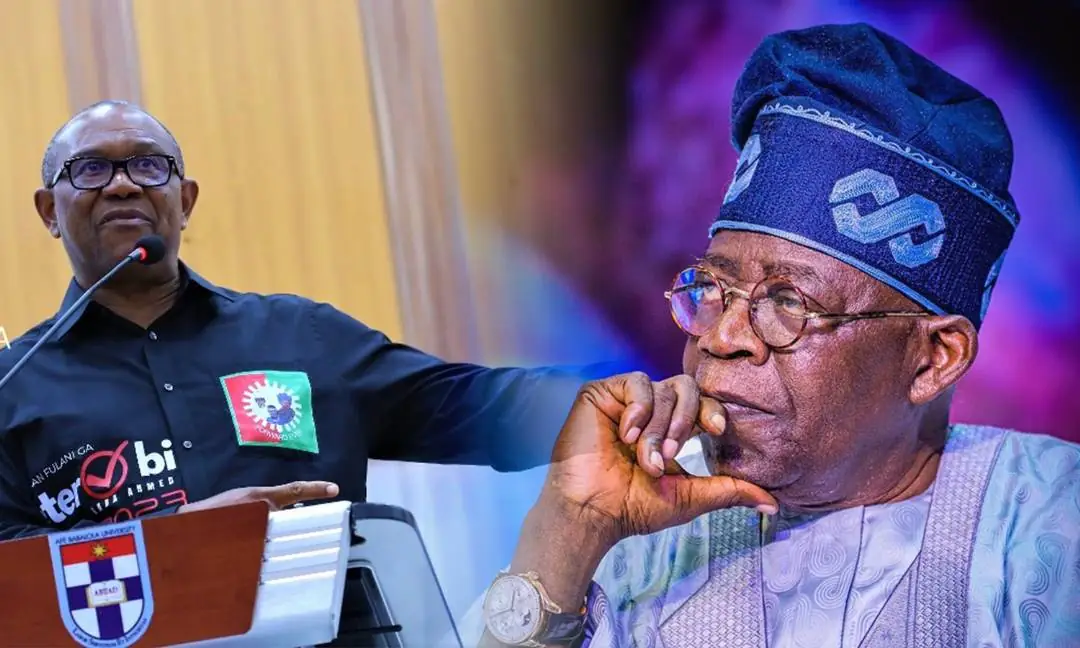In recent weeks, Labour Party’s 2023 presidential candidate Peter Obi has taken aim at President Bola Tinubu’s administration, criticizing everything from international trips to economic reforms and insecurity. While opposition is vital in any democracy, political debate must be rooted in facts and vision—not just emotion, sarcasm, or selective memory.
Obi’s sharp remarks—like “People are dying in Benue and our leaders are commissioning bus stops”—may stir public sentiment, but they also reveal a pattern of political posturing that lacks substance and responsibility. Such rhetoric, while popular, does not address the real challenges facing Nigeria or offer credible alternatives.
Tinubu’s Track Record vs. Obi’s Claims
President Tinubu’s record stands on public, historic achievements. As Lagos State Governor (1999–2007), he:
- Raised Lagos’ internally generated revenue from N600 million to over N10 billion monthly, building a foundation for fiscal independence.
- Created lasting institutions like LASTMA and LAMATA, which still serve Lagos today.
- Attracted global investment without reckless borrowing.
- Developed a merit-driven governance model that produced credible leaders, including Yemi Osinbajo, Babatunde Fashola, and Akinwunmi Ambode.
In contrast, Peter Obi’s time as Anambra State governor is remembered for:
- Saving money in banks but not investing significantly in education, infrastructure, or poverty reduction.
- Leaving no visible institutional legacy—no new industry, no large-scale educational reform, no transformative project.
- Sending his children abroad for education while offering no innovative solutions to improve public schools.
- Reducing governance to “cutting cost” rather than expanding opportunity—a philosophy that limits growth and stifles progress.

Moral Contradictions and Deceptive Politics
Obi’s statement, “Nobody abroad takes you seriously if you don’t have a stable government,” is ironic given the Labour Party’s ongoing leadership crises and legal infighting. His claim of readiness to “put his life on the line” for Nigeria rings hollow without a tested, national-level action plan or experience managing complex, conflict-ridden regions.
Obi often positions himself as a moral compass, referencing records with UNICEF and UNDP. But he has never held federal executive office, chaired a national economic council, or managed crises in volatile states like Benue or Zamfara.
As Dr. Gloria Adebajo-Fraser, MFR, a governance strategist, puts it:
“The test of leadership is not in avoiding difficult decisions but in guiding the people through them with courage and vision.”
The Real Economic Reality: Hard Choices, Not Populism
Nigeria’s current hardship is not a creation of the Tinubu administration. The pain stems from years of unsustainable fuel subsidies, multiple exchange rates, low productivity, and ballooning debt. The removal of fuel subsidy was not optional—it was required by global financial realities and written into loan agreements with the IMF and World Bank since 2020.
Currency floatation was a necessary correction to stop foreign exchange arbitrage and make Nigerian exports competitive. Tinubu’s government has acknowledged the hardship and taken bold steps to reduce the burden:
- Income-sensitive tax reforms, exempting small businesses and low-income individuals from certain taxes.
- Tuition-free federal technical colleges and vocational institutes for low-income families.
- Over N200 billion in palliatives, N125 billion for MSMEs, and N315 billion in soft loans and grants.
- A new digital revenue system and Nigeria Revenue Service to simplify compliance and eliminate multiple taxation.
The World Bank has disbursed over $2.25 billion in programmatic loans, tied to reform benchmarks—not wishful populism.
Stop the Politicization of Poverty
Obi’s pattern is clear: weaponize hardship, capitalize on frustration, and ignore complex realities. But Nigeria cannot afford a leader who confuses applause with solutions. The economic hardship is real, but so is the effort to mitigate it within contractual and structural limits.
Politicians who promise miracle recoveries without acknowledging fiscal constraints or the realities of global economics are either deceiving the people or exploiting their vulnerability.
The Way Forward: Competence Over Clatter
Nigeria needs builders, not blamers. President Tinubu may not be perfect, but he offers:
- A proven record of institutional development.
- Strategic, steady leadership in economic stabilization.
- A team-driven approach that encourages technocratic reforms.
Peter Obi, in contrast, offers emotionalism without economics, headlines without homework, and ambition without answers.
Conclusion
In this period of reform and national rebirth, Nigeria must not be distracted by populist opportunism. Those who seek to lead must present a coherent vision and demonstrate real capacity. Peter Obi has every right to participate in democracy, but he lacks the moral clarity, tested competence, and national reach to credibly position himself as a better alternative to President Tinubu.
As Nelson Mandela said, “A good head and a good heart are always a formidable combination.” Tinubu has both—and a track record to prove it. Nigeria needs performance, not pretence.
Stay woke. Stay tuned. Stay with AKEWE NEWS.